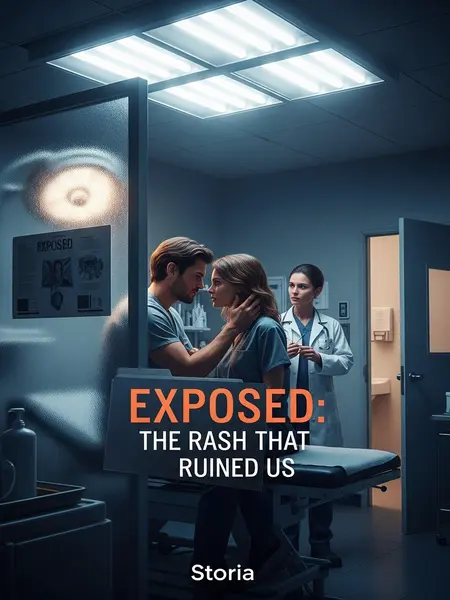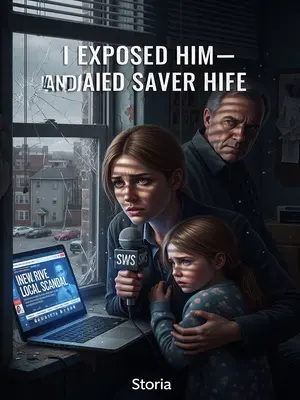Chapter 1: The Eczema Visit
I never expected a simple eczema visit to end with a breakup—and accusations flying across my exam room.
What began as another routine consult quickly spiraled into heartbreak, health scares, and the unraveling of a relationship right before my eyes.
As a physician, I know I’m not just treating symptoms. I’m piecing together stories, searching for the truth in what patients say—and what they don’t. Sometimes, being a doctor means you end up as the keeper of secrets no one else wants to hold.
A good-looking young man with a sharp, modern haircut and a trendy bomber jacket entered my exam room, girlfriend in tow. He smelled faintly of cologne and the cold outside air, like he’d just come in from a brisk walk. One hand clutched his insurance card, the other jammed deep in his jeans pocket.
He looked exactly like the kind of twenty-something you might spot at a hip downtown café—confident, a little restless, projecting the vibe of someone who knows all the latest streetwear drops and playlists. His girlfriend lingered behind him, arms folded so tightly across her chest her knuckles turned white, and she kept shifting her weight from foot to foot, glancing at my diploma as if searching for reassurance.
"What brings you in today? Where are you feeling off?" I asked, keeping my tone friendly but watching the tension flicker between them. Sometimes, couples show up like this—one dragging the other along, both on edge.
The boyfriend answered with a hint of impatience, "My eczema’s flaring up again—same as always. Just write me a prescription. My girlfriend dragged me here."
He spun around and yanked up his t-shirt to show me his back. I noticed the black leather watch on his wrist—cracked and worn—clashed with the rest of his carefully curated look.
Funny, the details you catch in an exam room—a cheap watch on an otherwise stylish outfit. Maybe it was a gift, or maybe just habit. Little things tell their own stories if you pay attention.
I examined his back: a scatter of rashes—light red, patchy, irregular shapes—stretched across his back, chest, and neck.
The fluorescent lights overhead made the redness almost glow. The room settled into an awkward hush as I leaned closer. His girlfriend fidgeted with her purse strap, eyes darting everywhere but at his skin.
I frowned slightly. Rashes like this aren’t always just eczema. Allergic reactions, shingles, and other possibilities flickered through my mind.
I’ve seen hundreds of eczema cases, but something about this one set off quiet alarms. My job isn’t just to accept the obvious—it’s to keep digging until the pieces fit.
"What have you used on it?" I asked.
"Hydrocortisone. I get eczema a lot, and this stuff always works for me," he replied, sounding almost proud, as if he’d cracked the code and just needed my signature to make it official.
His girlfriend spoke up, "He’s been using hydrocortisone for a week, but it’s not helping this time."
Her eyes darted to him, then down at her shoes, like she was bracing herself for the same argument all over again. Her voice cracked on the last word, the exhaustion of worry written in her posture.
"Hydrocortisone? For a whole week and it’s still not better?" I couldn’t keep the concern from my voice.
Hydrocortisone is a strong steroid cream. Usually, it knocks eczema down pretty quickly.
So, I started wondering—maybe we weren’t dealing with eczema after all.
The girlfriend noticed my hesitation and piped up, nervous, "Doctor, does it not look like eczema?"
Her question hung in the air, and for a moment, we all seemed to hold our breath.
The boyfriend, getting irritated, cut in, "I’ve had eczema for years. I know what it is. Just give me the cream."
His impatience was obvious, like he was used to getting his way—or at least, used to doctors who didn’t ask too many questions.
The med student shadowing me jumped in, "That’s a steroid—you gotta be careful. The more you use it, the worse your skin gets. Eczema never really goes away, but you can’t just keep slapping this stuff on."
I shot him a quick look—rookie mistake, but I’d save the lecture for later.
Eczema’s a stubborn thing to cure and comes back often. Hydrocortisone helps, but it’s still a steroid—best used sparingly.
Quick tip: Don’t use steroids for eczema unless you really need to. For flare-ups, over-the-counter hydrocortisone is milder than the prescription stuff, with fewer side effects.
Sometimes I wish that advice was printed right on the tube, next to the price tag.
But my gut was telling me—this wasn’t eczema.
That feeling you get when your gut is telling you something’s not right? This was it. The hum of the overhead lights felt louder. My pen hovered over the chart, waiting.
After the exam, I said, "This doesn’t look like eczema."
He spun back around, yanked his shirt down, and protested, "No way. It’s always been eczema. The cream always worked."
There was desperation in his voice, like repeating it might make it true.
That’s exactly the problem. If it always worked before, why not now?
When something’s off, there’s always a reason.
He looked skeptical, so I let it be for the moment.
I asked, "Any allergies? New clothes or underwear lately?"
Maybe it was an allergic rash.
He rattled off, "No. I had allergy tests before—dust mites, eggs, seafood, pollen, the whole panel. Doctor said I wasn’t allergic."
He said it like he’d rehearsed it for a test, already tired of the questioning.
Shingles crossed my mind—the rash fit, too.
I was about to order a shingles test when the girlfriend leaned in, looking flustered, and whispered:
"...take a look, take a look."
Her voice was so soft I almost missed it.
I looked up and saw the boyfriend’s face turn beet red, his ears burning, lips pressed tight.
She kept whispering in his ear, eyes worried, gently tugging at his shirt hem as if begging him to just let it out.
Her concern for him overtook any embarrassment. The tension in the room grew, everyone bracing for a secret about to spill.
I continued filling out the chart until, suddenly, the girlfriend blurted:
"Doctor, he has it down there too."
"What?" I was caught off guard. Could it really be…
The air went heavy. No one moved for a heartbeat. The only sound was the faint crinkle of the exam table paper as he shifted, suddenly self-conscious.
The med student looked up, eyebrows raised, and the boyfriend seemed ready to disappear.
I gathered myself and said, "Drop your pants, let me take a look."
I called the med student over, "Check out these small bumps in the groin area, with a ring of scaling at the tip. Remember what this looks like."
It was a classic teaching moment. I could see the med student mentally filing it away for his future rounds.
As the med student reached over, about to lift the shirt higher, I stopped him: "Gloves! Don’t touch patients with bare hands. Go wash up."
In the clinic, especially with possible infections, gloves are second nature. Still, I reminded him—small details separate pros from rookies.
Now I was almost certain—this was a classic STD.
No need for a shingles test. These scaly bumps were textbook. I ordered a full STD panel.
This is the part of medicine they never glamorize on TV—awkward, personal, and all too real. But these are the cases you remember.













